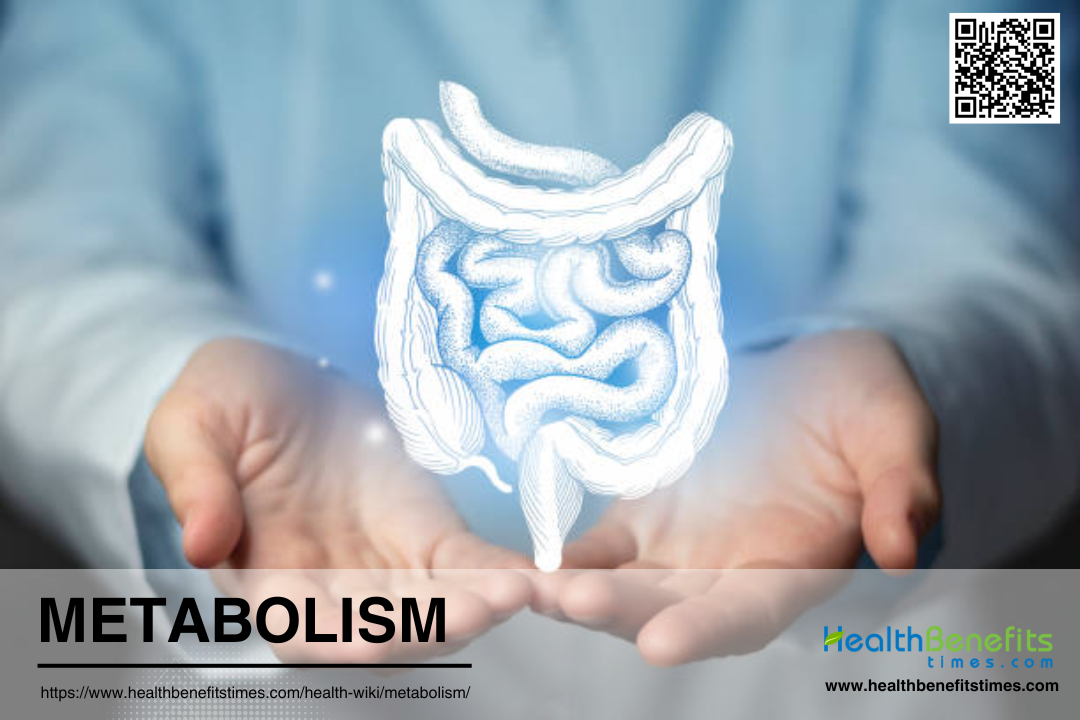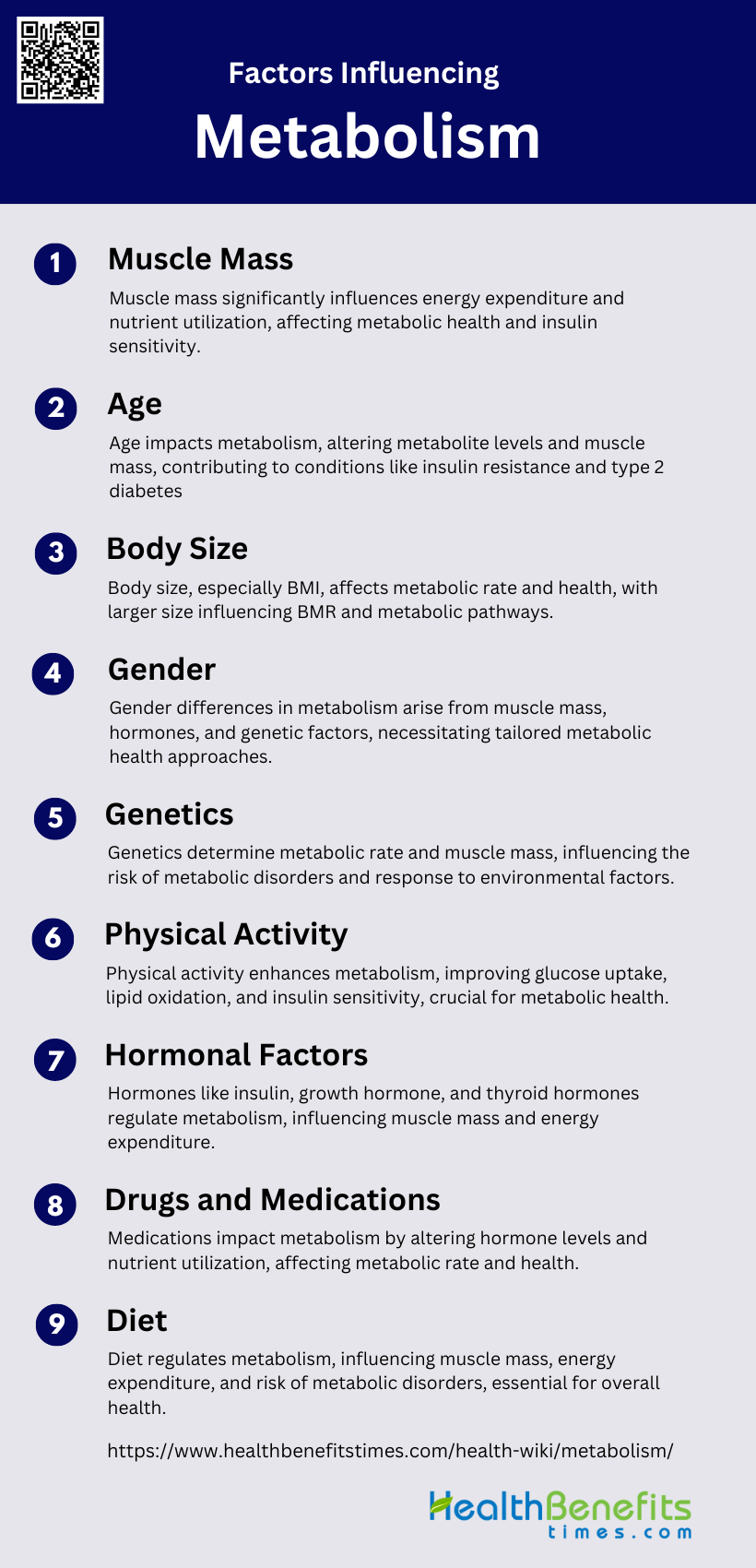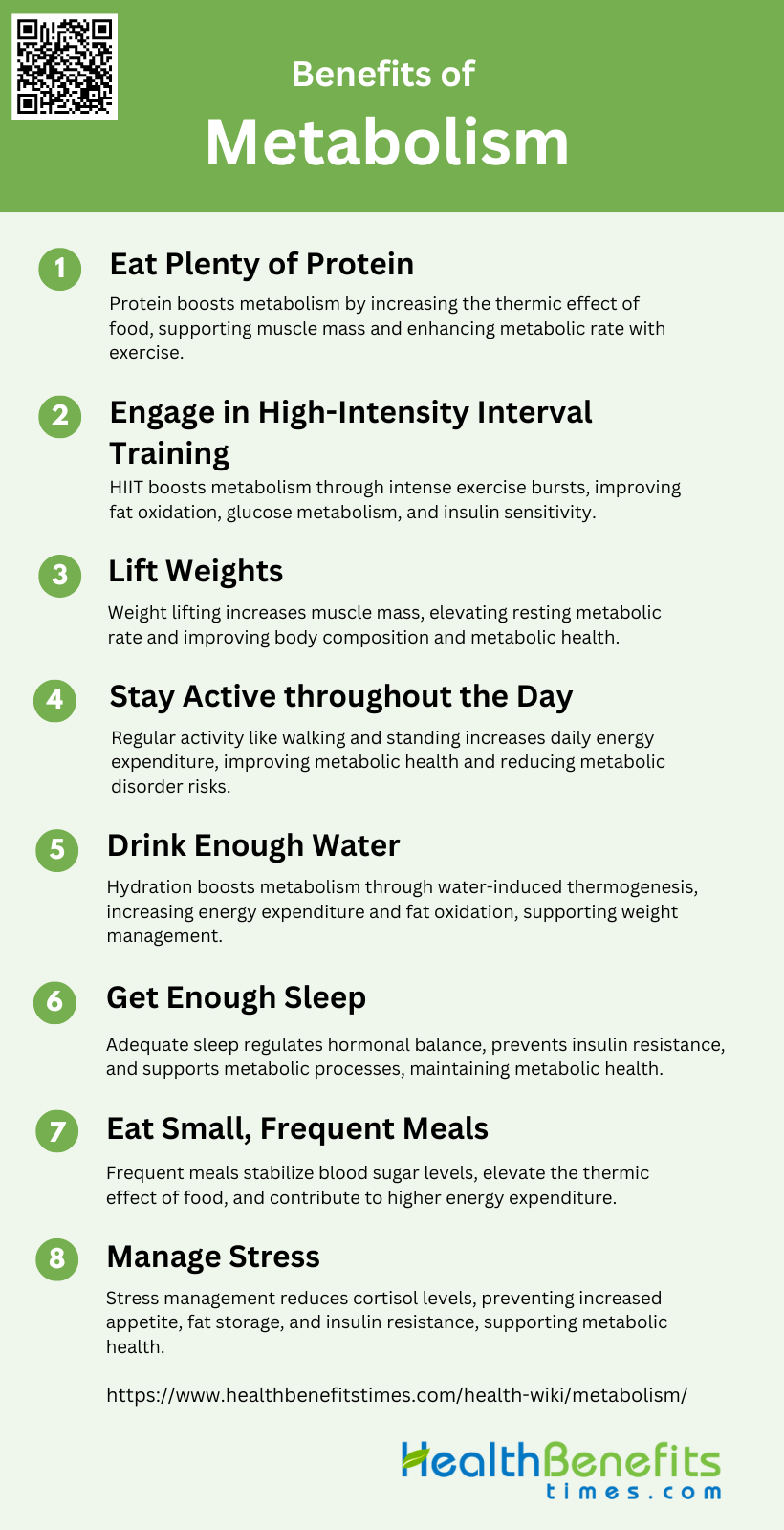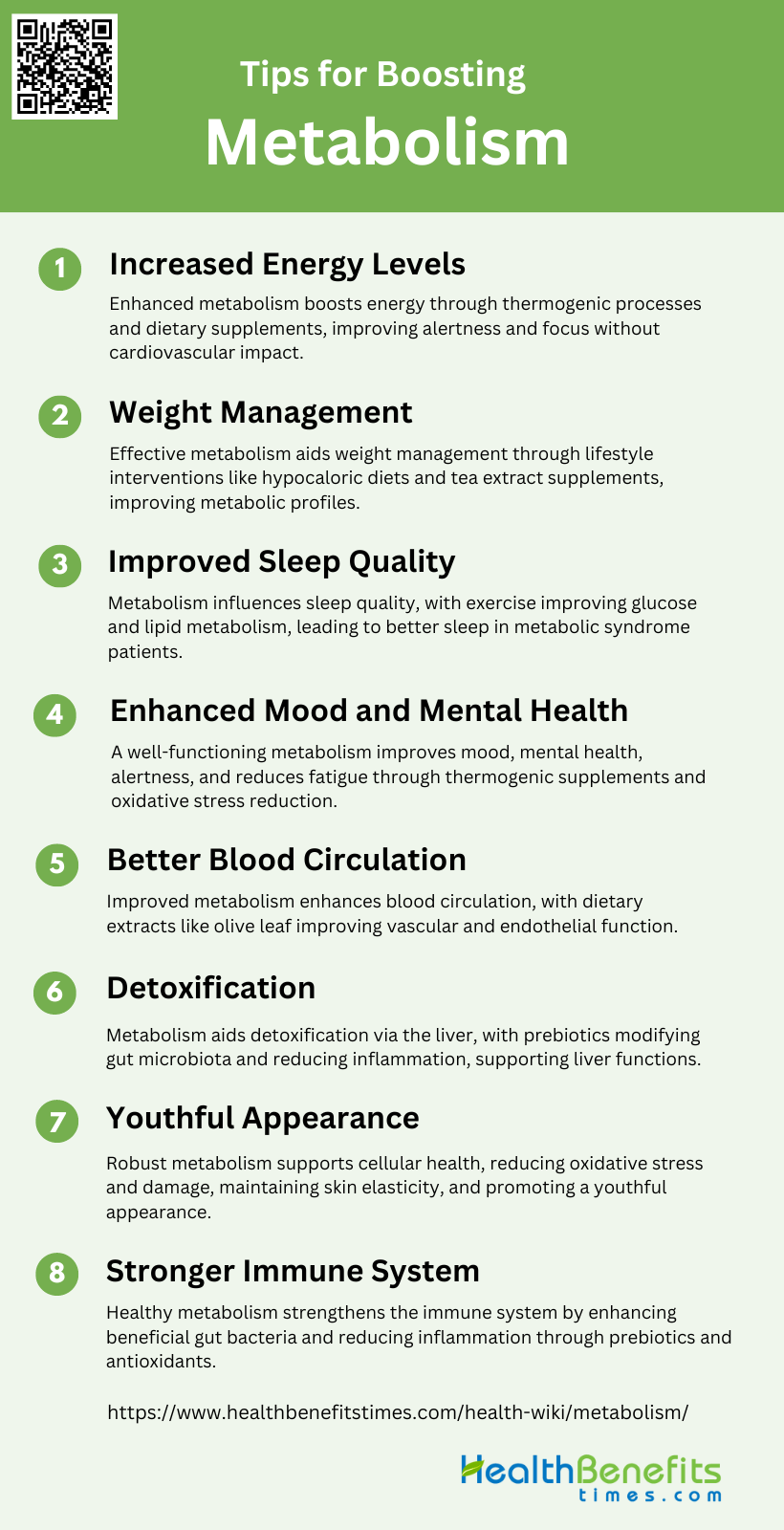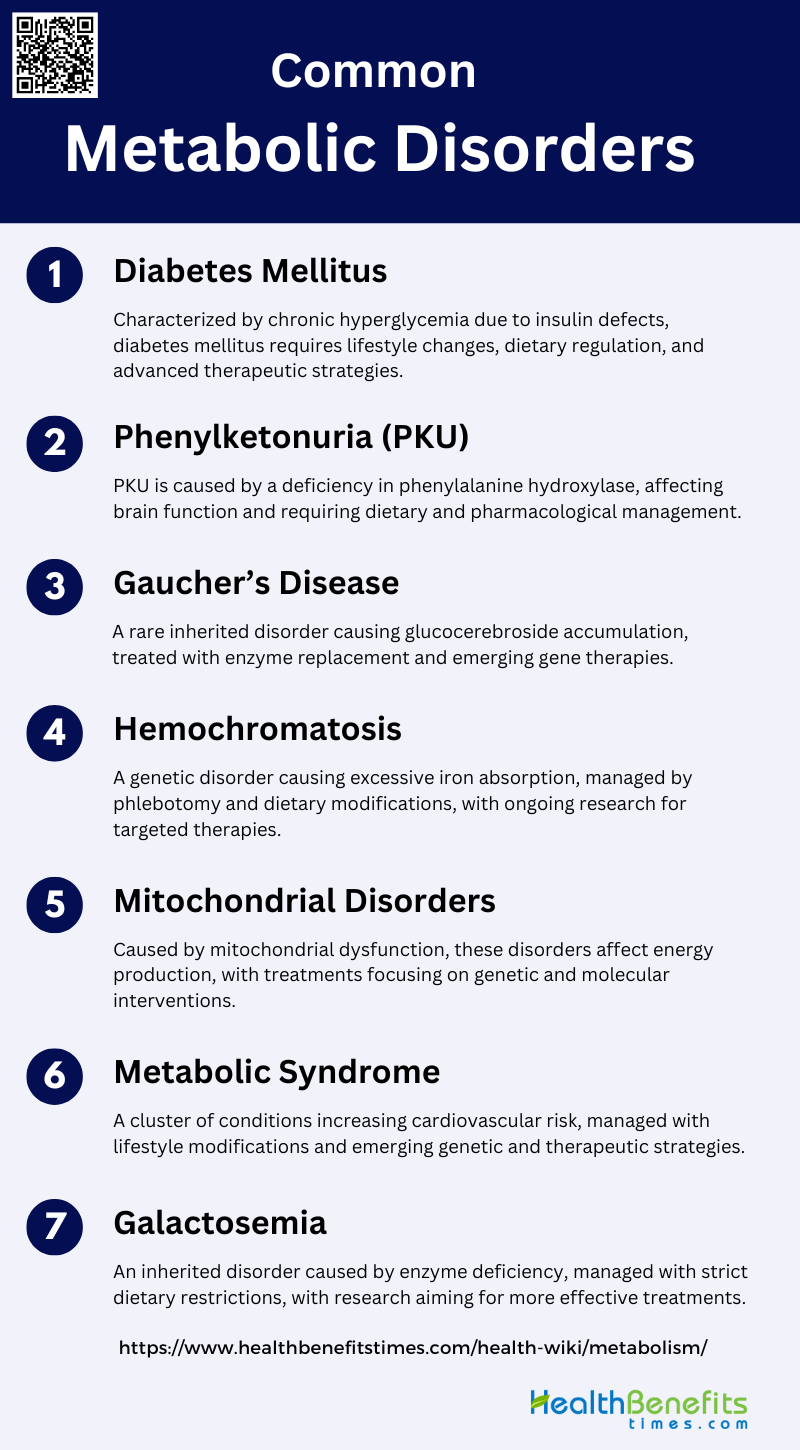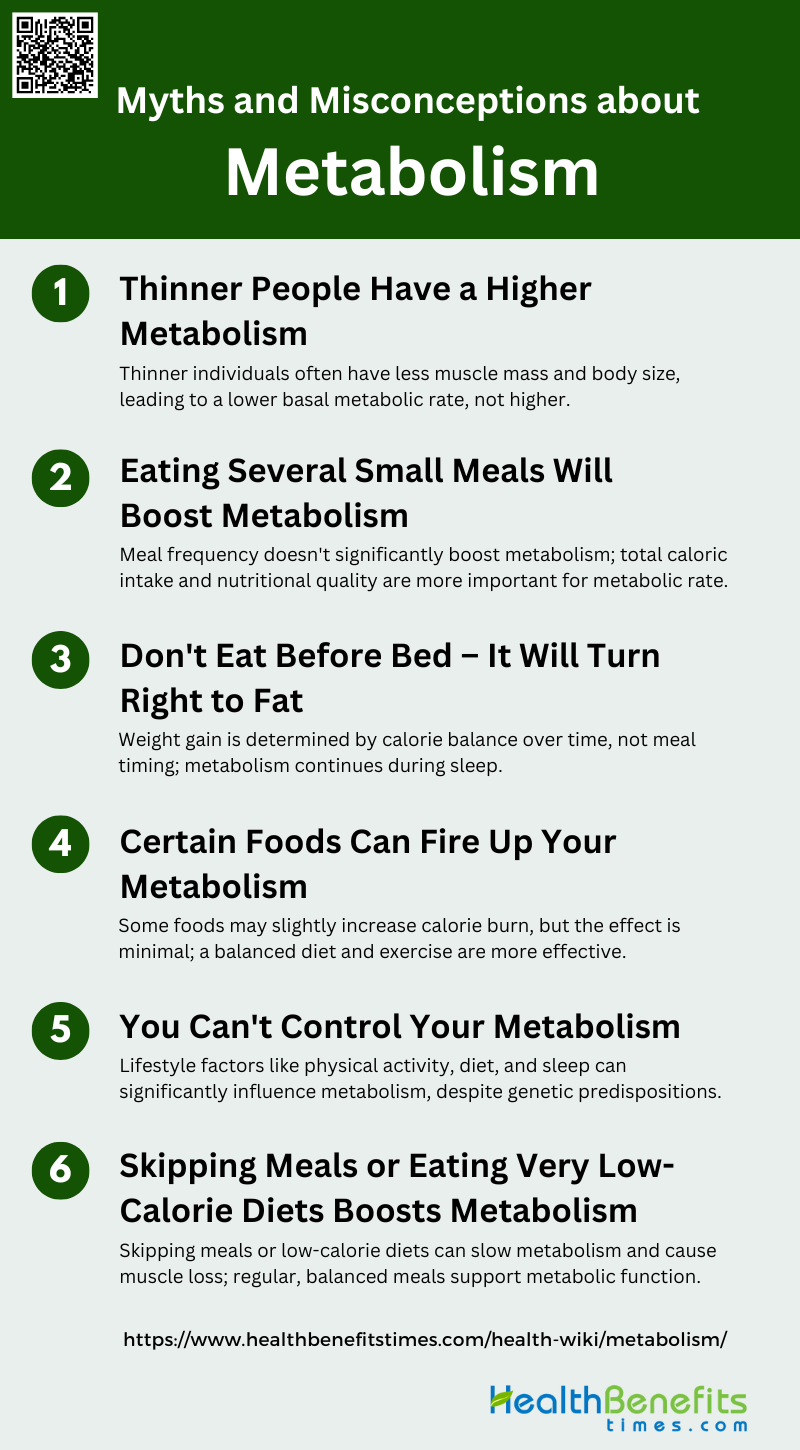Metabolism is the complex network of chemical reactions that occur within living organisms to maintain life. It encompasses all the processes by which cells convert nutrients into energy, build and repair tissues, and eliminate waste products. These biochemical reactions are essential for sustaining life, growth, and reproduction. Metabolism can be broadly divided into two categories: catabolism, which breaks down complex molecules to release energy, and anabolism, which uses energy to build complex molecules from simpler ones. The intricate balance of these metabolic pathways allows organisms to adapt to their environment, respond to stimuli, and maintain homeostasis. Remarkably, despite the vast diversity of life on Earth, many of the fundamental metabolic pathways and macromolecules involved in metabolism are highly conserved across different species, highlighting the universal importance of metabolism in sustaining life.
How Metabolism Works
Chemical Reactions
Metabolism encompasses all chemical reactions within the body, which are essential for sustaining life. These reactions include the transformation of energy and nutrients, the synthesis and degradation of complex macromolecules, and the excretion of waste products. Metabolic reactions are almost all enzyme-catalyzed and occur in specific pathways that are crucial for maintaining cellular functions and homeostasis. These pathways are organized to either maximize energy capture or minimize its use, ensuring that cells have the energy required to carry out their functions. The coordinated regulation of these pathways is vital for growth, reproduction, and response to environmental changes.
Energy Production
Metabolism plays a critical role in converting food into energy, which is necessary for cellular processes and overall survival. This conversion involves interconnected cellular pathways that utilize nutrients to produce energy, primarily through the tricarboxylic acid (TCA) cycle in mitochondria. The process includes the breakdown of glucose and fatty acids to generate ATP, the primary energy currency of cells. Dysregulation of these metabolic pathways can lead to various diseases, including obesity, diabetes, and cancer. Understanding the detailed mechanisms of energy production and its regulation offers significant therapeutic potential for treating metabolic disorders.
Two Main Processes of Metabolism
Metabolism consists of two main processes: catabolism and anabolism. These processes are essential for maintaining the body’s energy balance and supporting growth and repair. Below are brief descriptions of each process:
1. Catabolism
Catabolism is a crucial metabolic process that involves the breakdown of complex molecules into simpler ones, releasing energy that the body can use. This process is exergonic, meaning it releases energy, often in the form of adenosine triphosphate (ATP), which is essential for various cellular activities. Catabolism includes pathways such as glycolysis, where glucose is broken down into pyruvate, and lipolysis, where fats are broken down into fatty acids and glycerol. It is also involved in the degradation of proteins and nucleic acids. The energy released during catabolism is not only used for immediate cellular functions but also serves as a precursor for anabolic processes, maintaining the balance of the body’s metabolic needs.
2. Anabolism
Anabolism is the constructive phase of metabolism, where the body synthesizes complex molecules from simpler ones, requiring an input of energy, usually in the form of ATP. This process is endergonic, meaning it consumes energy. Anabolic pathways are responsible for the synthesis of essential biomolecules such as proteins, nucleic acids, lipids, and carbohydrates, which are vital for cell growth, repair, and maintenance. For instance, the synthesis of proteins from amino acids and the formation of DNA from nucleotides are key anabolic processes. Anabolism is regulated by various hormones and is crucial for maintaining the body’s structural integrity and function, especially during growth and recovery periods.
Factors Influencing Metabolism
Metabolism is influenced by various factors that determine the rate at which the body converts food into energy. These factors include genetics, age, physical activity, and diet. Below are some key factors that influence metabolism:
1. Muscle Mass
Muscle mass significantly influences metabolism due to its role in energy expenditure and nutrient utilization. Skeletal muscle accounts for approximately 40% of total body mass and is a major player in energy balance, influencing insulin sensitivity and lipid metabolism. Muscle mass is also directly related to thyroid hormone activity, with higher muscle mass associated with increased conversion of T4 to T3, particularly in men. Additionally, muscle mass and strength are protective factors against metabolic syndrome, independent of insulin resistance and abdominal fat accumulation. Understanding the mechanisms that control muscle mass can provide therapeutic targets for improving metabolic health and quality of life during aging.
2. Age
Age is a critical factor influencing metabolism, with older age often associated with metabolic dysregulation. Studies have shown that age impacts the levels of circulating small-molecule metabolites, such as amino acids and acylcarnitines, which are markers of metabolic health. Additionally, age contributes to the variability in basal metabolic rate (BMR), although its effect is relatively small compared to factors like fat-free mass. The decline in muscle mass and function with age also plays a significant role in metabolic health, contributing to conditions such as insulin resistance and type 2 diabetes. Therefore, age-related changes in metabolism are multifaceted, involving alterations in muscle mass, hormone levels, and nutrient utilization.
3. Body Size
Body size, particularly body mass index (BMI), is closely linked to metabolic health. Obesity and higher BMI are associated with metabolic dysregulation, including altered levels of amino acids and acylcarnitines. Larger body size also influences basal metabolic rate, with fat-free mass being a significant contributor to BMR variability. Additionally, body size impacts thyroid hormone metabolism, with increased muscle mass in individuals with higher BMI leading to enhanced thyroid activity. Therefore, body size is a crucial determinant of metabolic rate and overall metabolic health, influencing various physiological and biochemical pathways.
4. Gender
Gender differences in metabolism are influenced by various factors, including muscle mass, hormone levels, and genetic predispositions. While some studies suggest that sex does not significantly impact basal metabolic rate, others indicate that metabolic profiles can differ between men and women. For instance, glycine levels are inversely associated with male gender, suggesting a role in favorable metabolic health. Additionally, the relationship between muscle mass and thyroid hormone activity is more pronounced in men. These gender-specific differences highlight the need for tailored approaches in managing metabolic health and preventing metabolic disorders.
5. Genetics
Genetics play a fundamental role in determining metabolic rate and muscle mass. Genetic factors influence the boundaries of skeletal muscle size and its response to environmental and hormonal factors. Variations in genes related to muscle growth, such as those encoding for insulin-like growth factor (IGF)-I and myostatin, can significantly impact muscle metabolism and overall metabolic health. Additionally, genetic predispositions can affect the risk of developing metabolic disorders, such as type 2 diabetes and cardiovascular disease, by influencing muscle mass and function. Understanding the genetic basis of metabolism can help identify individuals at risk and develop personalized interventions.
6. Physical Activity
Physical activity is a major determinant of metabolic rate and overall metabolic health. Exercise influences muscle metabolism by enhancing glucose uptake, lipid oxidation, and insulin sensitivity. Endurance exercise, in particular, increases fatty acid oxidation and improves the blood lipid profile, reducing the risk of cardiovascular disease. Additionally, maternal physical activity can positively impact offspring metabolism, suggesting a transgenerational effect of exercise on metabolic health. Regular physical activity is essential for maintaining muscle mass, preventing metabolic disorders, and improving overall health outcomes.
7. Hormonal Factors
Hormonal factors, including insulin, growth hormone, and thyroid hormones, play a crucial role in regulating metabolism. Insulin and growth hormone are key regulators of protein metabolism, influencing muscle mass and overall metabolic health. Thyroid hormones, particularly the conversion of T4 to T3, are influenced by muscle mass and play a significant role in metabolic rate. Hormones such as fibroblast growth factor 19 (FGF19) can also increase metabolic rate and improve metabolic health by enhancing fat oxidation and reducing liver triglycerides. Understanding the hormonal regulation of metabolism can provide insights into managing metabolic disorders and improving health outcomes.
8. Drugs and Medications
Drugs and medications can significantly impact metabolism by altering hormone levels, nutrient utilization, and energy expenditure. For instance, treatment with fibroblast growth factor 19 (FGF19) has been shown to increase metabolic rate and improve metabolic health in mice by enhancing fat oxidation and reducing liver triglycerides. Additionally, medications that influence thyroid hormone levels can affect metabolic rate and overall metabolic health. Understanding the effects of drugs and medications on metabolism is essential for developing effective treatments for metabolic disorders and optimizing therapeutic outcomes.
9. Diet
Diet plays a critical role in regulating metabolism and overall metabolic health. Nutrient intake influences muscle metabolism, with amino acids acting as signaling molecules that regulate protein turnover and muscle mass. Diet also impacts the metabolic status of individuals, with maternal diet during gestation affecting offspring metabolism and the risk of developing chronic diseases. Additionally, dietary factors such as caloric intake and nutrient composition can influence basal metabolic rate and the risk of obesity and metabolic disorders. A balanced diet that supports muscle mass and metabolic health is essential for preventing metabolic disorders and promoting overall well-being.
Benefits of Metabolism
Metabolism plays a crucial role in maintaining overall health and well-being by converting food into energy and supporting bodily functions. An efficient metabolism can enhance energy levels, aid in weight management, and improve cellular repair. Below are some key benefits of metabolism:
1. Increased Energy Levels
Enhanced metabolism can significantly boost energy levels. Studies have shown that increasing energy expenditure through thermogenic processes, such as those facilitated by brown or beige adipose tissue, can lead to improved metabolic health and extended longevity. Additionally, the ingestion of thermogenic dietary supplements has been found to increase resting energy expenditure and improve perceived energy levels, alertness, and focus without causing significant cardiovascular changes. These findings suggest that a well-regulated metabolism can help maintain higher energy levels throughout the day.
2. Weight Management
Effective weight management is closely linked to metabolic health. Lifestyle interventions that promote weight loss, such as a hypocaloric Mediterranean diet combined with regular physical activity, have been shown to improve the plasma metabolic profile in metabolically healthy obese women. Furthermore, the consumption of tea extract supplements has demonstrated beneficial effects on weight loss and the improvement of lipid and glucose metabolism in individuals with metabolic syndrome. These interventions highlight the role of metabolism in achieving and maintaining a healthy weight.
3. Improved Sleep Quality
Metabolism also plays a crucial role in sleep quality. A study on elderly patients with metabolic syndrome found that combined aerobic and resistance training programs significantly improved sleep quality, as measured by the Pittsburgh Sleep Quality Index (PSQI). This improvement in sleep quality is likely due to the positive effects of exercise on metabolic health, including better glucose and lipid metabolism. Therefore, a healthy metabolism can contribute to more restful and restorative sleep.
4. Enhanced Mood and Mental Health
A well-functioning metabolism can positively impact mood and mental health. The ingestion of thermogenic dietary supplements has been associated with increased alertness, focus, and energy, as well as decreased fatigue. These mood-enhancing effects are likely due to the improved metabolic processes that support better overall mental health. Additionally, the reduction of oxidative stress through sustained caloric restriction has been linked to improved mental well-being.
5. Better Blood Circulation
Improved metabolism can enhance blood circulation, which is vital for overall health. For instance, the consumption of olive leaf extract in diet-induced obesity models has been shown to ameliorate vascular dysfunction and improve endothelial function. These benefits are attributed to the anti-inflammatory and immunomodulatory properties of the extract, which help maintain healthy blood vessels and circulation. Thus, a healthy metabolism supports better cardiovascular health.
6. Detoxification
Metabolism plays a key role in the body’s detoxification processes. The liver, a central organ in metabolism, is responsible for detoxifying harmful substances. Studies have shown that metabolic interventions, such as the administration of prebiotics like galactooligosaccharides, can positively modify gut microbiota and reduce markers of inflammation and lipid metabolism. These changes support the liver’s detoxification functions, highlighting the importance of a healthy metabolism in maintaining the body’s ability to eliminate toxins.
7. Youthful Appearance
A robust metabolism can contribute to a youthful appearance by supporting cellular health and reducing oxidative damage. Caloric restriction has been shown to slow metabolic rate and reduce oxidative stress, which are associated with aging. By minimizing oxidative damage, a healthy metabolism helps maintain skin elasticity and overall vitality, contributing to a more youthful appearance.
8. Stronger Immune System
A healthy metabolism is essential for a strong immune system. The administration of prebiotics, such as galactooligosaccharides, has been found to enhance immune function by increasing beneficial gut bacteria and reducing inflammation. Additionally, the consumption of blueberries has been shown to decrease markers of oxidative stress and inflammation, further supporting immune health. These findings underscore the role of metabolism in maintaining a robust and responsive immune system.
Tips for Boosting Metabolism
Boosting your metabolism can help improve energy levels, support weight management, and enhance overall health. Simple lifestyle changes can make a significant difference in metabolic rate. Below are some effective tips for boosting metabolism:
1. Eat Plenty of Protein
Consuming adequate protein is essential for boosting metabolism as it increases the thermic effect of food (TEF), which is the energy required to digest, absorb, and process nutrients. Protein has a higher TEF compared to fats and carbohydrates, meaning it require more energy to metabolize. Additionally, protein intake supports muscle mass maintenance and growth, which is crucial for a higher resting metabolic rate. Studies have shown that combining protein intake with exercise, such as resistance training or high-intensity interval training (HIIT), can further enhance muscle protein synthesis and metabolic rate.
2. Engage in High-Intensity Interval Training (HIIT)
High-Intensity Interval Training (HIIT) is an effective way to boost metabolism. HIIT involves short bursts of intense exercise followed by rest or low-intensity periods. This type of training has been shown to increase fat oxidation and improve metabolic flexibility, even without weight loss. HIIT can also enhance glucose metabolism and insulin sensitivity, which are critical for metabolic health. Moreover, HIIT has been found to reduce liver fat and improve cardiac function in individuals with non-alcoholic fatty liver disease (NAFLD). These benefits make HIIT a powerful tool for boosting overall metabolic rate.
3. Lift Weights
Weight lifting or resistance training is another excellent way to boost metabolism. This form of exercise increases muscle mass, which in turn elevates the resting metabolic rate because muscle tissue burns more calories at rest compared to fat tissue. Resistance training has been shown to improve body composition and metabolic health markers, such as insulin sensitivity and glucose metabolism. Additionally, combining resistance training with other forms of exercise, like HIIT, can further enhance metabolic benefits and support long-term weight management.
4. Stay Active throughout the Day
Staying active throughout the day is crucial for maintaining a high metabolic rate. Activities such as walking, standing and other forms of non-exercise physical activity can significantly contribute to daily energy expenditure. Even small changes, like taking the stairs instead of the elevator or walking during breaks, can add up and help boost metabolism. Regular physical activity has been shown to improve metabolic health markers and reduce the risk of metabolic disorders. Therefore, incorporating more movement into daily routines is essential for sustaining a healthy metabolism.
5. Drink Enough Water
Drinking enough water is vital for optimal metabolic function. Water is involved in various metabolic processes, including the digestion and absorption of nutrients. Staying hydrated can also temporarily boost metabolism through a process known as water-induced thermogenesis. Studies have shown that drinking water can increase energy expenditure and fat oxidation, contributing to a higher metabolic rate. Additionally, replacing sugary beverages with water can help reduce calorie intake and support weight management, further enhancing metabolic health.
6. Get Enough Sleep
Adequate sleep is essential for a healthy metabolism. Poor sleep quality or insufficient sleep can disrupt hormonal balance, leading to increased appetite and reduced energy expenditure. Sleep deprivation has been linked to insulin resistance, impaired glucose metabolism, and an increased risk of metabolic disorders. Ensuring sufficient and quality sleep can help regulate metabolic processes and support overall health. Studies have highlighted the importance of sleep in maintaining metabolic flexibility and preventing metabolic diseases.
7. Eat Small, Frequent Meals
Eating small, frequent meals throughout the day can help maintain a steady metabolic rate. This approach can prevent large fluctuations in blood sugar levels and reduce the likelihood of overeating. Frequent meals can also keep the thermic effect of food (TEF) elevated, contributing to higher daily energy expenditure. While the impact of meal frequency on metabolism may vary among individuals, it can be a useful strategy for some people to manage hunger and maintain energy levels.
8. Manage Stress
Managing stress is crucial for maintaining a healthy metabolism. Chronic stress can lead to elevated levels of cortisol, a hormone that can increase appetite and promote fat storage, particularly in the abdominal area. High cortisol levels are also associated with insulin resistance and impaired glucose metabolism. Effective stress management techniques, such as mindfulness, exercise, and adequate sleep, can help regulate cortisol levels and support metabolic health. Studies have shown that reducing stress can improve metabolic markers and reduce the risk of metabolic disorders.
Common Metabolic Disorders
Metabolic disorders can disrupt the body’s ability to convert food into energy, leading to various health issues. These disorders can be genetic or acquired and often require medical management. Below are some common metabolic disorders:
1. Diabetes Mellitus
Diabetes Mellitus is a prevalent metabolic disorder characterized by chronic hyperglycemia due to defects in insulin secretion, insulin action, or both. It poses a significant challenge to public healthcare systems and has a profound impact on productivity and the economy. Advances in genomic, transcriptomic, proteomic, and metabolomic platforms have driven the discovery of underlying genetic factors associated with Diabetes Mellitus, leading to the development of new therapeutic molecules and experimental strategies such as gene editing and RNA interference. Current therapeutic approaches still heavily depend on lifestyle changes, dietary regulation, and the maintenance of good mental health.
2. Phenylketonuria (PKU)
Phenylketonuria (PKU) is an inborn error of phenylalanine metabolism caused by a deficiency in phenylalanine hydroxylase, leading to the accumulation of phenylalanine and its metabolites in tissues and body fluids. This metabolic disorder primarily affects the brain, causing oxidative stress, mitochondrial dysfunction, and impaired protein and neurotransmitter synthesis. The elucidation of these metabolic disturbances is crucial for developing better therapeutic strategies to improve the quality of life for PKU patients. Despite dietary and pharmacological treatments preventing intellectual disability, suboptimal outcomes such as bone mineral disease have been reported.
3. Gaucher’s Disease
Gaucher’s Disease is a rare inherited metabolic disorder caused by a deficiency in the enzyme glucocerebrosidase, leading to the accumulation of glucocerebroside in various body tissues. This disorder is part of a group of conditions known as lysosomal storage diseases. The development of orphan drugs for Gaucher’s Disease remains in its infancy due to a lack of investment in research and development. Current therapeutic approaches include enzyme replacement therapy and substrate reduction therapy, but personalized therapeutics based on gene silencing and related technologies are emerging as potential treatments.
4. Hemochromatosis
Hemochromatosis is a genetic disorder characterized by excessive iron absorption and accumulation in the body, leading to tissue damage and organ dysfunction. Advances in genomic studies have identified key genetic mutations associated with Hemochromatosis, enabling better diagnosis and management of the disease. Therapeutic approaches primarily focus on regular phlebotomy to reduce iron levels and dietary modifications to limit iron intake. Research is ongoing to develop more targeted therapies that address the underlying genetic causes of Hemochromatosis.
5. Mitochondrial Disorders
Mitochondrial disorders are a group of metabolic diseases caused by dysfunctions in the mitochondria, the energy-producing organelles in cells. These disorders can result from mutations in mitochondrial DNA or nuclear DNA that affect mitochondrial function. Mitochondrial encephalopathy, lactic acidosis, and stroke-like episodes (MELAS) are among the most widely studied mitochondrial disorders. Current research focuses on understanding the genetic and molecular basis of these disorders to develop targeted therapies. Interventions include dietary modifications, exercise regimens, and experimental strategies such as gene editing.
6. Metabolic Syndrome
Metabolic Syndrome is a cluster of conditions, including insulin resistance, hypertension, dyslipidemia, and central obesity, that increase the risk of cardiovascular disease and type 2 diabetes. The modern socio-economic system has led to lifestyle changes that contribute to the prevalence of Metabolic Syndrome. Advances in high-resolution genomic and metabolomic studies have identified genetic and epigenetic factors associated with Metabolic Syndrome, leading to the development of new therapeutic strategies. Current approaches emphasize lifestyle modifications, including dietary changes and increased physical activity, to manage and prevent Metabolic Syndrome.
7. Galactosemia
Galactosemia is a rare inherited metabolic disorder caused by a deficiency in the enzyme galactose-1-phosphate uridyltransferase, leading to the accumulation of galactose-1-phosphate in the body. This disorder can cause severe complications, including liver damage, intellectual disability, and cataracts if not managed properly. Parents of children with Galactosemia report a health-related quality of life comparable to parents of healthy children, but significantly better than parents of children with other metabolic disorders. Current management strategies focus on strict dietary restrictions to eliminate galactose from the diet, but ongoing research aims to develop more effective treatments.
Myths and Misconceptions about Metabolism
There are many myths and misconceptions about metabolism that can lead to confusion and misinformation. Understanding the truth about metabolism can help you make better health decisions. Below are some common myths and misconceptions about metabolism:
1. Myth: Thinner People Have a Higher Metabolism
It is a common misconception that thinner individuals have a higher metabolism. In reality, metabolic rate is influenced by several factors, including age, sex, muscle mass, and overall body size. Thinner people often have less muscle mass and body mass, which can actually result in a lower basal metabolic rate (BMR). Muscle tissue burns more calories at rest compared to fat tissue, so individuals with more muscle mass tend to have a higher metabolism regardless of their body fat percentage. Therefore, being thin does not necessarily equate to having a faster metabolism.
2. Myth: Eating Several Small Meals Will Boost Metabolism
The idea that eating several small meals throughout the day can significantly boost metabolism is widely believed but not supported by scientific evidence. While eating small, frequent meals may help some people manage hunger and maintain steady energy levels, it does not inherently increase metabolic rate. The thermic effect of food (TEF), which is the energy expended to digest, absorb, and process nutrients, remains relatively constant regardless of meal frequency. What matters more for metabolism is the total caloric intake and the nutritional quality of the diet.
3. Myth: Don’t Eat Before Bed – It Will Turn Right to Fat
The belief that eating before bed will automatically lead to weight gain is a myth. Weight gain is primarily determined by the balance between calories consumed and calories expended over time, not the timing of meals. While late-night eating can be associated with poor food choices and overeating, it does not directly cause fat accumulation. The body’s metabolism does not shut down during sleep; it continues to burn calories to maintain essential functions. Therefore, what and how much you eat matters more than when you eat.
4. Myth: Certain Foods Can Fire Up Your Metabolism
Many people believe that certain foods, such as spicy foods or green tea, can significantly boost metabolism. While some foods may have a minor thermogenic effect, meaning they slightly increase the number of calories burned, the impact is usually minimal and not enough to cause significant weight loss. For instance, the capsaicin in chili peppers and the caffeine in coffee can temporarily raise metabolic rate, but these effects are short-lived and not substantial enough to rely on for weight management. A balanced diet and regular physical activity are more effective for maintaining a healthy metabolism.
5. Myth: You Can’t Control Your Metabolism
Contrary to the belief that metabolism is entirely out of one’s control, there are several ways to influence it. While genetics do play a role in determining metabolic rate, lifestyle factors such as physical activity, diet, and sleep can also have a significant impact. Building muscle through strength training can increase BMR because muscle tissue burns more calories at rest than fat tissue. Staying active, eating a balanced diet rich in nutrients, and getting adequate sleep can all contribute to a healthier metabolism. Thus, while you may not be able to change your genetic predisposition, you can adopt habits that support metabolic health.
6. Myth: Skipping Meals or Eating Very Low-Calorie Diets Boosts Metabolism
Skipping meals or following very low-calorie diets with the aim of boosting metabolism is not only ineffective but can also be harmful. When the body is deprived of adequate calories, it can enter a state of “starvation mode,” where the metabolic rate slows down to conserve energy. This can lead to muscle loss, nutrient deficiencies, and a decrease in overall energy levels. Instead of skipping meals, it is more beneficial to eat regular, balanced meals that provide the necessary nutrients to support metabolic function and overall health.


